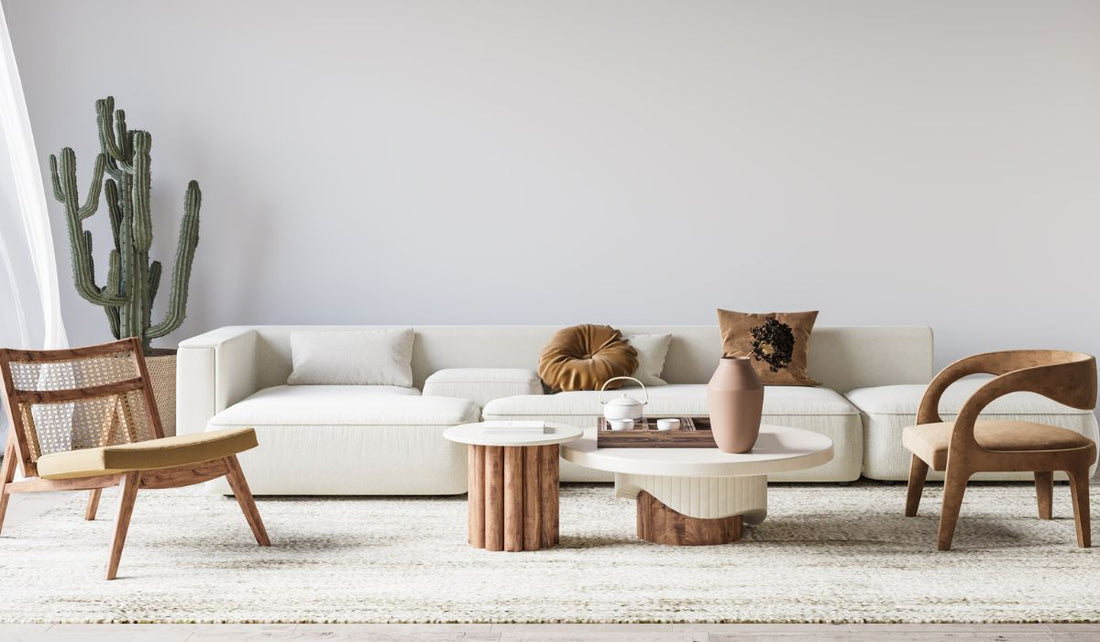Transforming a house into a home is all about the little details. And regarding interior design, there's one element that can truly tie a room together - rugs. The art of rug placement can make or break the overall aesthetic of your space, creating a picture-perfect home that exudes style and sophistication. But with so many options and factors to consider, finding the perfect placement for your rugs can be overwhelming. That's where our expert tips come in. In this guide, we'll share our insider knowledge on how to master the art of rug placement, ensuring that every room in your home feels balanced, cohesive, and visually stunning. Whether you're looking to create a cosy living room, a serene bedroom, or a stylish dining area, our tips will help you achieve the perfect rug placement that elevates your space to new heights. Get ready to transform your home with our expert advice and create a picture-perfect sanctuary that reflects your style.
Importance of Rug Placement in Interior Design
Rug placement is a crucial aspect of interior design, as it can tie all room elements together and create a harmonious space. The right rug placement can anchor furniture, define areas, and add warmth and texture to a room. Depending on your design goals, it can also act as a statement piece or a subtle backdrop.
When considering rug placement, it's important to think about the overall layout and flow of the room. The rug's size, shape, and style should complement the furniture and the room's architectural features. Additionally, the colour and pattern of the carpet should enhance the existing colour scheme and add visual interest to the space.
Rug Placement Tips for the Living Room
The living room is often the heart of the home, where family and friends gather to relax and unwind. The right rug placement can create a cosy and inviting atmosphere in this space. Here are some tips to consider when placing a rug in your living room:
1. Size Matters:
Choose a large rug to fit all the furniture in the seating area. Ideally, the front legs of the sofa and chairs should be on the rug, while the back legs can be off the rug. It creates a sense of cohesion and anchors the furniture.
2. Placement Options:
There are several placement options for a rug in the living room. You can place it in the centre of the seating area, allowing all the furniture to sit on the carpet. Alternatively, you can position the rug in front of the sofa, with the coffee table on top. It creates a defined area and adds visual interest.
3. Layering:
Consider layering rugs for added texture and dimension. You can place a smaller rug on top of a larger one, creating a layered look. It works well if you have a neutral base rug and want to add a pop of colour or pattern.
Rug Placement Tips for the Dining Room
The dining room is a space where families gather to share meals and create memories. The right rug placement can enhance the dining experience and unite the room. Here are some tips to consider when placing a rug in your dining room:
1. Size and Shape:
Choose a large rug to fit the dining table and chairs comfortably. The rug should extend beyond the table's edges, allowing enough space for the chairs to be pulled out without falling off the rug. A rectangular rug works best for a rectangular table, while a round rug complements a round table.
2. Placement Options:
Position the rug in the centre of the dining area, ensuring all the chair legs are on the carpet when pushed in. It creates a cohesive look and prevents the rug from shifting when chairs are moved. Alternatively, you can place the rug under the dining table, with the chairs on the mat. It creates a defined space and adds visual interest.
3. Easy Maintenance:
Consider the practicality of the rug in a dining room setting. When selecting a carpet, it's best to use a material that is easy to clean and can resist spills and stains. To ensure durability and longevity, consider choosing wool or synthetic fibres capable of handling heavy foot traffic.
Rug Placement Tips for the Bedroom
The bedroom is a sanctuary to relax and unwind after a long day. The right rug placement can add warmth, comfort, and style to this intimate space. Here are some tips to consider when placing a rug in your bedroom:
1. Size and Placement:
Choose a large rug to extend beyond the sides and foot of the bed. It creates a luxurious and cosy feel. You can either position the rug under the bottom two-thirds of the bed or place it completely under the bed, with the nightstands on top. It creates a defined area and adds visual interest.
2. Texture and Comfort:
Consider the rug's texture in a bedroom setting. Opt for soft, plush materials like wool or shag rugs that feel luxurious underfoot. This feature creates a more comfortable and cosy atmosphere in the area.
3. Color and Pattern:
Choose a rug that complements your bedroom's colour scheme and style. If your bedroom has a neutral colour palette, To create a focal point in your bedroom, consider opting for a bold pattern or vibrant coloured carpet. If you have an eclectic taste, you can create a bohemian look by combining different colors and patterns.
Rug Placement Tips for the Hallway
The hallway is often overlooked for rug placement, but it can be a great opportunity to add style and personality to your home. Here are some tips to consider when placing a rug in your hallway:
1. Size and Shape:
Choose a rug that fits the dimensions of your hallway. A long, narrow rug works best for a hallway, adding visual interest and creating a sense of direction. Ensure the rug is wide enough to cover the entire hallway width without leaving too much empty space on the sides.
2. Placement Options:
Position the rug in the centre of the hallway, allowing an equal amount of space on both sides. It creates a balanced and cohesive look. Alternatively, you can place the rug at the end of the hallway, making a focal point and drawing the eye towards a specific area.
3. Pattern and Color:
Consider your home's overall style and colour scheme when choosing a rug for the hallway. To make a statement, select a carpet with a bold pattern or vibrant colour. Alternatively, you can choose a rug with a subtle way or neutral colours to create a more understated look.
Rug Placement Tips for the Entryway
The entryway is guests' first impression of your home, so it's important to make it welcoming and visually appealing. The right rug placement can set the tone for the rest of your home. Here are some tips to consider when placing a rug in your entryway:
1. Size and Shape:
Choose a rug that fits the dimensions of your entryway. A rectangular or round rug works best for an entryway, adding visual interest and creating a defined area. Make sure the rug is large enough to cover the space in front of the door and allow room for the door to open and close without catching on the rug.
2. Placement Options:
Position the rug in the centre of the entryway, creating a focal point and drawing the eye towards the door. Ensure the rug is centred and aligned with the architecture of the space. Alternatively, placing the carpet off-centre creates a more dynamic and unexpected look.
3. Durability and Easy Maintenance:
Consider the practicality of the rug in an entryway setting. When selecting a carpet, opting for one sturdy and capable of enduring frequent walking is important. Opt for materials like jute or sisal that are dirt-resistant and easy to clean.
How to Choose the Right Rug Material for Different Areas
In addition to size and placement, choosing the right rug material is essential to ensure longevity and performance. Different areas of your home have additional requirements for rug materials. Here are some popular rug materials and their suitable areas:
1. Wool:
Wool rugs are popular for living rooms, bedrooms, and dining rooms. They are soft, durable, and naturally stain-resistant. Wool rugs also have excellent insulating properties, making them ideal for colder climates.
2. Synthetic Fibers:
Synthetic rugs, such as nylon or polyester, are a practical choice for high-traffic areas like hallways and entryways. These items have a strong build, are simple to maintain, and can withstand stains and fading. Synthetic rugs are also a more affordable alternative to natural fibres.
3. Natural Fibers:
Natural fibre rugs, such as jute, sisal, or seagrass, are a great choice for adding texture and warmth to any space. They work well in living rooms, bedrooms, and entryways. However, they may not be suitable for dining areas, as they can be difficult to clean and may stain easily.
4. Silk:
Silk rugs are luxurious and add a touch of elegance to any space. They are best suited for low-traffic areas like bedrooms or formal living rooms. However, silk rugs require special care and are more prone to damage, making them less practical for high-traffic areas.
Conclusion: Enhancing Your Home with Perfect Rug Placement
Mastering the art of rug placement is a surefire way to elevate the overall aesthetic of your home. Following our expert tips, you can create balanced, cohesive, visually stunning spaces that reflect your style. From the living room to the bedroom, the dining room to the hallway, and the entryway to the bedroom, each area of your home can benefit from the perfect rug placement. Remember to consider the rug's size, shape, and material, as well as the overall layout and flow of the room. With attention to detail and expert guidance, you can transform your home into a picture-perfect sanctuary that exudes style and sophistication. So experiment with rug placement, and watch as your space comes to life with warmth, texture, and visual interest. Happy decorating!




